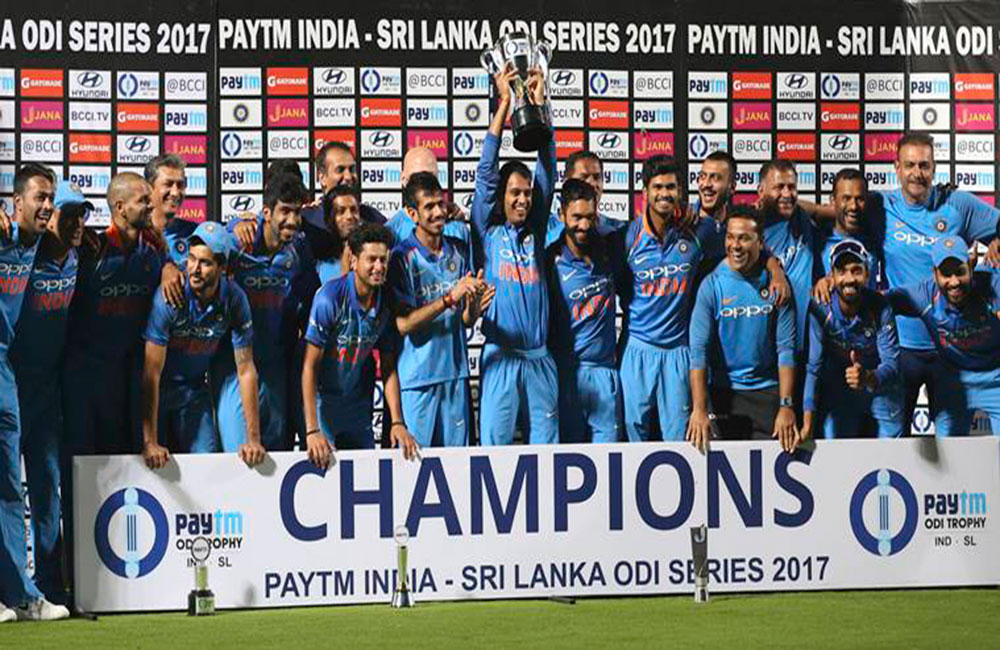Sri Lanka were spun around in Visakhapatnam, so starkly that if they were a cartoon character, they would have seen little Kuldeep Yadavs and Yuzvendra Chahals dancing in a circle over their heads. Then out came Shreyas Iyer and Shikhar Dhawan to knock them out. Chases of 216 are often one-sided and when it was done, India emerged with their eighth straight series victory in ODIs – matching a world-beating Australian side in 2000s and second only to the legendary West Indians in 1980s.
Poor Upul Tharanga watched it all happen – though the temptation to find a quiet corner to bang his head against the wall must have been strong – having made a virtually flawless 95 off 82 balls. As opener, he gave his team a rapid start, hitting five successive boundaries in the ninth over. As senior player, he did all he could to bat as long as possible. So long as he was in the middle, Sri Lanka had a good chance at scoring over 300 and securing their first series win in India. As soon as he fell – stumped by an absolute pearler from Kuldeep – a collapse ensured. There were eight wickets for only 55 runs.
Now, there were no demons in the pitch. But the same could not be said of a certain 23-year old in only his first year of international cricket. India waited until the end of the Powerplay to deploy Kuldeep. And his control of line and length, through a 10-over spell that cost only 42 runs and reaped three wickets, was quite remarkable. The standout though was his bowling slow through the air, backing himself to beat batsmen with dip and drift.
His faith wasn’t misplaced. Tharanga, getting into all the right positions until that point, was drawn into a cover drive. He had every reason to play the shot, with the ball wide outside off and nicely tossed up. But the thing dipped, then turned sharply enough to beat the bat of a man five short of a hundred. MS Dhoni did the rest.
Then there was Chahal, who isn’t quite as big a turner of the ball, but is fast becoming India’s best weapon against an attacking batsman. Earlier in the season, he made Glenn Maxwell spontaneously combust by bowling wide of his reach. The same ploy worked against Sadeera Samarawickrama, brought in for this game at the expense of Lahiru Thirimanne.
The swap was, at first, working splendidly with Sri Lanka’s second wicket contributing 121 runs at 6.42 per over and Samarawickrama prospering by coming down the track every second or third ball he faced from the spinner. As wedded as he was to that gameplan, his shot selection was very good; nothing rash, or against the turn. In fact, he was one of the few batsmen who picked the googly, once smashing Kuldeep to the long-off boundary and looking a million dollars doing it. But against Chahal, much like others before him, he went after a wide one, without reaching the pitch of it, and was caught off a bit of an outside edge for 42.
A series decider, and one played against a team which owns its backyard the same way as Mitchell Starc owned James Vince’s off stump, requires each member of the XI to stand up and make themselves count. Sri Lanka, however, were stuck with nine men who could not get past a score of 20.
That made life quite easy for India’s batsmen. Even after they lost captain Rohit Sharma to a peach of a googly from Akila Dananjaya in the fourth over of the chase.
Dhawan found fluency pulling Suranga Lakmal wide of mid-on. Matching the audacity of that shot were cover-driven fours off perfectly good length balls and a square cut so brutal it zipped through the hands of short point before he knew what was happening. He finished 100 not out and in the process became the second-fastest Indian to 4000 ODI runs, behind Virat Kohli.
More pleasing for India would have been Iyer’s display. He is sometimes squared up by an outswing bowler, throwing up tantalising leading edges, but bowl too close to his body or even a little wide of off stump, and he is a natural at the cut and flick shot. Additionally, he seems to read length so very early, especially against spin. There was one shot that typified this. In the 18th over, when Sri Lanka brought Dananjaya back, their best source of a wicket, for a new spell, he got back and across to a good-length ball in line with the stumps, and with a straight bat, punched a couple through midwicket.
The dominance of a team in home conditions is the norm in all kinds of sport, but a stretch of 15 successive bilateral series, across formats, without a single loss, is still rather astonishing. This is India’s position in world cricket right now, brimming with talent that knows how to make the most of sub-continent conditions. Remarkably, they come into the side well equipped for top-flight cricket. Three of their four match-winners on Sunday, for example, were less than two years old at international level.


Leave your comments
Login to post a comment
Post comment as a guest